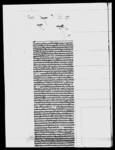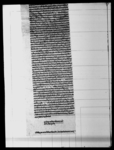An arjī from Jagatsera Khatrī Chetrī re his journey through Tibet and China (VS 1925)
ID: DNA_0003_0047
Edited and
translated by Axel Michaels
in collaboration with
Manik Bajracharya and Pabitra Bajracharya
Created: 2019-01-29;
Last modified: 2021-03-04
For the metadata of the document, click here
The accompanying edition, translation/synopsis and/or commentary are available under the terms of the Creative Commons Attribution-ShareAlike 4.0 International License
Abstract
This letter written by Jagatsera Khatrī from Calicalau reports about a journey through Tibet and China. In it Khatrī tells of a troubled British citizen, Thomas Thornville Cooper, whom he helped to go to India, and also about the transport of opium.Diplomatic edition
[1r-part1]
1श्री\1⟪नं२८०⟫1श्री५वादसाह2१1श्री५सर्कार
2२1श्रीभोट्सर्कार
2३1अर्जि¯¯¯¯¯¯¯¯¯¯¯¯¯¯¯¯¯¯¯¯¯¯¯¯
2उप्रांत∙ष्वामितकरुणानिधान्∙यसअर्जिभंदाअघिकोहालषवर१९२५सालभाद्रशु
3दि२रोज५मावाथांसहरवाटचह्राइपठायाकाअर्जिवाटजाहेरहोला∙औलिथांसहर
4काधेवाहरूलाई∙वाथांसहरसंमपुर्याउनानिमित्त∙जिंमादियाकाअफिंकाभारि∙मध्ये
5वाथांपुगिवुझिलिदाअफिंकाभारि२षोलामाषस्योभनि∙वुझाउननसक्याकाभारि
6२केअफिंग्यामा१२८केदरग्यामा१केचादिटाक३।६कादर्लेज्माचांदिटाक४६०।८
7लिथांकाधेवाहरूले∙हामिसगै∙पठायाकामानिसहरूलेषाल्सावालसगउठाई∙दि
8यार∙नीजचादिबुझिलीभाद्रशुदि५रोज१कादिनवाथांसहरवाटहामिसेवकहरू
9पनि∙नेपालतर्फ∙रमानाभैआञ्यूँ∙वाथांवाट२दिनकावाटोआई∙षोजनिभंन्यागाउ
10मापुग्याकैदिनमाअघिवाथाङ्वाटहजुरमाअर्जिलेषिचह्राइपठायाका∙मिष्टरकु
11परनामगर्याको∙अंग्रेजपनि∙यसैगाउमा∙पेचिन्तिर∙जानालाई∙आउदारह्याछन्
12मतेसगाउमापुग्याकाषवर∙नीजअंग्रेजलेसुन्याछन्र∙नीजअंग्रेजसाहेवलेम
13सगभेट्गर्नआयार∙मैलेभेट्गर्यौ∙नीजसाहेववाट∙यसगाउमातपाईले१दिंमुका
14म्गरिदिनुभया∙मेराजोभयाकोदुषदर्दविस्तारगर्दाहुँभनिभंदानीजसाहेवकाव
15चन्मानि१दिंनीजगाउमामुकाम्गर्यार∙नीजसाहेवलेगर्याकोकुरो∙पैल्हेठिंडफु
16वाट---१---काठुलामुषतियार∙चुंदुच्यांचुंङ्वाटभोट्ल्हासानेपालहिंदुस्थान्
17जानलाईराहादानिगरिदिदासोराहादानि∙लीकन∙येस्तर्फआञाँ∙वाटामाआउदा
18तौस्यान्तौस्यान्देसमार∙तार्चन्देउसहरमा∙लीथांमावाथांमा∙सुविस्तैसगआ
19ञाँर∙केहिदिनवाथाङ्मावसीथकाइमारि∙वाहापछिल्हासातर्फजाउभनि∙घोडा
20षाल्साकोवंदोवस्तगर्दा∙तेहिवेलामाभोट्कासिवानावाट३५०हतियारवाध्या
21कासिपाहिपठाई∙मलाइसाह्रै∙दुषदिया∙तकोहोस्क्याहोस्भनिधेरैकुरागर्दा
22मैले---१---काठुलामंत्रिलेदियाकोराहादानि∙देषाञाँ∙निजराहादानिलाईप
23निकेहिमानेनन्∙तलुच्चाहोस्∙जुन्वाटोआयौ∙उसैवाटफर्किजाउ∙हाम्रामुलुकवा
24टजानहुदैनभनिभंदाआफुयेउटार२।३जनाचाकरमात्रहुदा∙मेराज्यूअनाहक्मा
25जाला१जनालेयतिकासगजोरगरि∙ज्यानगयोभन्या∙वहुतपाजीठहर्न्यादेषतार∙इ
26नीहरूले∙इनिकामुलुकवाटजाननदिन्यादेषतावरू∙इउन्यान्कामुलुकवाट∙ब्रह्मा
27कोमुलुकनिस्कीकलकत्ताजानाको∙मनसुवगरि∙गयाँर∙जादामावाटामाषानुपिनु
28वस्नुमासाह्रैदुषपायाँ∙आफुसगधन्भैकनपनि∙यस्ताजंगली∙मुलुकमाकेहिला
29ग्दोरहेनछ∙केहिदिन्गोठभेटेकाठाउमा∙दुदरअलीअलिकाचोपिठोषाईजिविका
30चलाइ२०दिन्कोवाटोगयापछिइउन्यान्कामुलुकमापुग्यार∙ताहाचिनियाहरू
31लेपक्रि३५दिंसम्ममलाइकैदगर्या---१---कातेत्रा∙मंत्रीकाराहादानिदेषाउदा
32मापनिआफुनुमंत्रिकाराहादानिमानेनन्र∙ढेरैचादिषर्चगरि∙ताहावाटउम्क्यर
33ब्रह्माकामुलुकतिरजाउभंन्या∙मनसुवगरिदिं३कोवाटोसंमगञार∙चिनियैचिनिया
34कोसाह्रैठुलोलडाइलेवाटोघाटो∙सवैवंदभयाकोदेषदा∙फेरीचिनैकोवाटोगरि
35हिंदुस्तानजांछुभनित्यहिवाटोफर्किआयाकाहुँ∙अघिजादामाभंदाफर्किआउ
36दाझन् साह्रैदुषपाञाँ∙आफुचह्रन्याघोडाकोषुट्टोभाचियोर∙छोडिआञ्यूँ∙अरू
37घोडा∙ज्यालादिदामापनि∙षांवालिहरूलेघोडादियेनन्∙आफनुदामलेकिनी
38चह्रिजाउभन्यापनिपायेनर∙येस्ताअघोरिजंगलीऔवर्फानकादेसमाढेरैदिंसं
39मपैदलहिडिआउनुपर्दासाह्रैफजितषाइआउदा∙तपाइसगयाहाभेट्भयोभनि
40नीजसाहेवलेवृतांतकुरागर्दामावृटीसर्कारकोर---२---कोसाह्रैदोस्तीहुदा
41मैलेपनिइसाहेवले∙साह्रैदुषपाई∙वडावडाआपत्षाईआयाकोदेषतामेरोपनी
42छातिरहेन∙मैलेपनि∙सकेसंमकोषातिरगर्या∙जोमसितभयाकोषान्यापिन्याप
43निदिञाँ∙मासुपनिषाननपायाको∙ढेरैदिनभयाछन्र∙भेडापनिदिञाँ∙नीज साहे
44वलेपैदलहिडिकष्टषाइआयाकोदेषता∙मसितवढियाघोडाथियो∙तेहिघोडानीज
45साहेवलाइदिञाँ∙भोटेहरूकोठुलोतुलुकुलाम्∙देषदामेरासाथलागिआनाकोकेहि
[1r-part2]
46कुरागरेनन्भोलिपल्ट∙नीजसाहेवमसितआइविदाभै∙मलाइयस्ताआपदमाति
47मिलेघोडादियाकोमैले∙योगुन्विर्सन्याछैनभनि∙ठिंडफुतिरगया∙मपनि∙तेसैदिन
48माभोट्कामिवानाल्हाम्दिभंन्यागाउमाआञा∙नीजजगामाभोट्काकाजकाम्ग
49र्न्यामंगाम्ठेचिपनिआया∙गोर्षालीहरूले∙ढेरैअंग्रेजआफनैपहिरन्गराइल्याया
50काछन्भंन्याकुरा∙ल्हासामाभै∙याहामंगाम्वस्न्यामंगाम्ठेचीलाइपनिठुलोदस्कत्
51आयाकोछभंन्यासमाचारवाहिरीकुरामात्रै∙सुनियो∙तेस्कोमुद्दाकुरोकेहिथाहा पा
52येन∙याहामंगाम्ठेचेलेभन्या∙ढेरैअंग्रेज∙ठिंडफुवाटल्यायाकाछन्भनिजगाजगामा
53सिपाहिराष्याकारह्याछन्सेवानामापनिसिपाहिराष्याकाछन्भंन्यावाहिरिकुरा
54सुन्या∙हामिलेभन्यादेषेनौ∙प्रभु∙हामिलेहजुरकापाउछोडिआयाको३सालभयो
55हाम्रासाथमाल्हासाकाअंवावाटसाथलाइदियाकोउचुइस्मेत्३।४जनार चि
56नियासिपाहि२०।२५जनाकास्याल्का४काजिलेसाथलाइपठाइदियाकोभोटे
57भारादारफुफुछिरिंनाउगर्याको१जना∙यतिमानिस∙रातदिंहाम्रासाथैमाछ
58न्ठिंडफुकाचुंदुवाटपनितार्चिन्देउसहरसंमतांताल्चेमान्गर्याकोचिनिया
59भारादार१पठाइदियाकोथियो∙जगाजगाकाभारादारआफनाआफनासिवा
60नासंम∙पुर्याउदैजाचदैगरिआयाकाछन्∙हामिलेहाम्रासाथमा∙अंग्रेज लुका
61इल्यायाकोभया∙हामिसगैआउन्यानीजभारादारलेनैल्याउनदिन्याथियेनन्∙
62मनैमानभयाकोकुराआजहामिलेल्यायाकोछभंन्या∙यत्रोतुलुकुलाम्गरि
63राष्याकोरहेछ∙ल्हामदिभंन्याभोट्कादोसाधमाचिनियाभारादार∙नीजमंगाम्
64वस्न्याभोट्याभारादार∙मंगाम्थेचे∙हामिहरू∙ज्माभै∙जोचाहिन्या∙घोडाषाल्साको∙
65कुरागर्यौ∙फेरि∙हामिसग∙ढेरैअंग्रेजल्यायाकोछभंन्याकुराका∙गल्वा∙मावेवुजैमा
66इन्ले∙तुलुकलाम्∙गर्याकोसुंदा∙चिनियाभारादार∙भोटेभारादार∙भयाकावेलामा∙यो
67कुरोगर्यादेषिवढियाहोलाभंन्या∙मेराचित्तलेदेषदा∙नीज∙भोटेभारादार∙मंगाम्ठेचे
68सग∙हामिगोर्षाकाकाजिहरूले∙ठिंडफुदेषिढेरैअंग्रेजहरूसगैल्यायाकाछन्भनि
69ढेरैसिपाहिसिवानामाल्याइराष्याकारह्याछौ∙हामिसितकतिअंग्रेजरहेछकति
70देष्यौहामिलेअंग्रेजल्यायोभंन्याकुराकाहासुन्यौ∙आफनु---२---काकाममाआ
71याथ्युँ∙आफनाराज्यमाफर्किजांछौ∙हामिहरूले∙अंग्रेजल्याउनुनल्याउनुका कु
72रागर्दामासाछिचिनियाभारादार∙भोट्काभारादार∙यहिछन्∙सोधिहेरभंदानिज
73मंगामथेचेले∙गोर्षा----२---र---३---यकैहुन्∙तपाइहरूवाटल्यायोभन्याको
74पनिहोइन∙तपाइहरूवाटल्याउलाभंन्याहाम्रामनसा∙पनिछैनयत्रा---१---
75कासौगात्आयाकावेलामालुकिछलिआयाकोहोलान्भनि∙हामिसेव़ानामा
76वस्न्याभारादारहरूलेजाचनुपर्नालेमानिसरह्याकाहुन्भनिभन्योर∙तिन्कासि
77वानामातिन्लेजाचवुझगर्नुपर्छभनिभंदा∙हामिले∙जवाफकेहिदियेनौहामि
78हरूलाइपनि∙नीजमंगाम्थेचेलेजोचाहिन्याषाल्साकोवंदोवस्तगरिदियार
79ल्हाम्दिगाउवाटभाद्रशुदि१२रोज१मारमानाभैआईभाद्रशुदि१३रोज२मामंगा
80उपुग्यौआजसंम---२---कोरतर्फतर्फकाफर्मायसिषरिदभयाकोर∙हामि से
81वकहरूकोस्मेत्ज्माघोडा५५षरिदभैसकियोहामिसेवकहरूकावुद्धिलेभेट्यासं
82मजाचिलीराष्याकोछ∙आजसंमघोडापनिसवैसावुदछन्∙ञाहावाट हामिह
83रूआश्वीनवदि१रोज४मारमानाभैआउछुजोभयाकाहालषवरकोअर्जिलेषि
84चह्राइपठायाकोहो∙पछिपनिजोभयाकाहालषवरकोअर्जिलेषिचह्राइपठा
85उन्याकामगरूंला∙हरपमाउचनिचपर्याकोसेवकमाथिक्षेमाराषिवक्स्या
86जावस्∙विज्ञेचरणेषुकिमधिकं¯¯¯ ¯¯¯ ¯¯¯ ¯¯¯ ¯¯¯ ¯¯¯
87सदासेवक∙काजिजगत्सेरषतृ क्षतृको
88कोटि२दंडवत्कुर्नेस्¯¯¯ ¯¯¯ ¯¯¯
89इतिसंवत्१९२५सालमितिआश्विनवदि१रोज४मुकांचलीचलाउशुभम्¯¯¯ ¯¯¯ ¯¯¯
Translation
[1r]
No. 2801
1 - The Emperor (of China)
2 - His Majesty's Government (of Nepal)
3 - The Government of Tibet
Petition (arji)
Uprānta: Master, Compassionate One, the earlier news from the letter of Thursday, the 2nd day of the bright fortnight of Bhādra in 1925, which I sent from the city of Vāthāṃ2 will be known to you. Local porters (? dhevā) of the city of Aulithāṃ3 were given the responsibility of delivering loads of opium to the city of Vāthāṃ. Of the loads that were to be handed over after arriving in Vāthāṃ 2 could not be delivered because they fell into a river. For the 2 loads that could not be delivered, the costs of 128 gyāmās4 —with 1 gyāmā being equal to 3|6 (3.1.6) silver ṭākas—totals 460|8 silver ṭākas.5 Men whom the [Au]lithām porters sent with us collected [the money] from the Khālsā6 agents. Having received the silver, we [your] servants departed for Nepal from the city of Vāthāṃ on Sunday, the 5th of the bright fortnight of Bhādra.
Having walked for 2 days from Vāthāṃ, we reached the village called Khojani. It so happened that the Englishman named Mr. [T.T.] Cooper had arrived there that same day on his way to Pecin (Beijing)—the man about whom I had written to you, Your Excellency, from Vāthāṃ. This English sahib heard of my arrival in that village and he came to meet me, and [so] I met him. Then this sahib asked me to stay 1 day in that village so that he could explain me his sufferings. I agreed and stayed for 1 day in that village. This is what the sahib told me:
“Some time ago, from Ṭhiṃḍaphu7 , Cuṃducyāṃcuṃṅ, a high-ranking minister of the (Chinese) Emperor provided (to me) a travel document to go to Lhasa [in] Tibet, [and to] Nepal and India. I came here with [that] travel document. I proceeded leisurely along the way, arriving in the province of Tausyān Tausyān and the cities of Tārcandeu8 , Lithāṃ (Lithang) and Vāthāṃ. As I was preparing the horses etc. to depart for Lhasa after resting a few days in Vāthāṃ, they sent 350 armed soldiers (sipāhi) from the Tibet border and caused me great trouble. When they interrogated me—who and what I was—I showed them the travel document provided by the Emperor’s high-ranking minister. They didn’t accept the travel permit, saying, ‘You’re a rogue. Return to where you have come from. You cannot pass through our territory.’ I was alone with only 2-3 servants,9 and seeing that it would be awful were my life to end in vain for standing ground against so many persons, and seeing that they would not allow me to pass through their territory, I instead decided to [pass] through the territory of Iunyān (Yunnan), come out in the territory of Burma and go on to Calcutta. On the way I suffered greatly for [lack] of food and shelter. Even though I had some wealth, it was of no use in such an uncivilized territory. After 20 days of surviving on milk and some plain wheat flour I found in a place where I had come upon pastureland, I reached the territory of Iunyān. There the Chinese arrested me and jailed me for 35 days. Even though I showed them the travel document from the Emperor’s high-ranking minister, they didn’t accept their own minister’s travel document. [Only] by paying out a lot of silver [could] I escaped from there. Wishing to go to the land of Burma, I walked for another three days. However, due to the very big war among the Chinese people10 , everything along the way was closed. I decided that I would go to Hindustāna back through China. I suffered even more on the way back than before. My horse broke a leg and I had to abandon it. The Khāmbālis (i.e. Khampas) did not give me a horse, even though I [would have] paid them. Although I wanted to buy it with my own money, I couldn’t do so. I had to walk on foot for several days in such dangerous, uncivilized and snowy territory. Finally, completely exhausted, I met you.”
When he told this I couldn’t contain myself, given the great friendship between the British Government and the Nepalese Government, and having seen the utterly great suffering the sahib had been through, I did as much as I could for him. I gave him whatever food I had. Since he hadn’t eaten meat for several days, I gave him a sheep, and when I saw the trouble the sahib had walking, I also gave him a good horse. When we saw a large tulukulām11 of Tibetans, [he] didn’t say anything [more] about staying with me. The next day the sahib came to me to bid farewell and said: “I will never forget the favour you bestowed upon me by providing me with a horse in such a desperate time.”
Then he (again) departed for Ṭhiṃḍaphu. I arrived on the same day in a village called Lhāmdi12 at the Tibetan border. At this place, a Tibetan officer, a maṃgāmṭheci13 , came to me. The rumour was that the Gorkha[li]s have brought several Englishmen, dressing them as themselves, had arrived in Lhasa, and the maṃgāmṭheci of Maṃgām received a big signature (i.e., a letter from a high authority) from there. However, we couldn’t verify the substance of it. This was told to us by the maṃgāmṭheci. Under the suspicion that several Englishmen had been brought from Ṭhiṃḍaphu, soldiers were placed at different places including the border. We have only heard rumours but haven’t seen [things] for ourselves.
My Lord, it has been three years that we left your feet. These people are with us day and night: 3 [or] 4 persons including the Ucui14 who were provided to us by the ambā (Chinese ambassador) in Lhasa, 20 [to] 25 Chinese soldiers, and a Tibetan official named Phuphuchiriṃ15 provided by the four kājīs of Kāsyāl. A Chinese soldier named Tāṃtālce accompanied us from Cuṃdu (Chamdo?) [sector] of Ṭhiṃḍaphu up to Tārcindeu16 town. High officials at various places accompanied us to their borders and questioned [us]. If we had surreptitiously brought with us Englishmen, these officials would not have allowed us through. Suspecting that we had brought [Englishmen], even though we didn’t think of such a thing, they assembled a great tulukulām. At the crossroads called Lhāmdi in Tibet we gathered together with Chinese soldiers and the Tibetan official, the maṃgāmṭheci of Maṃgām, and discussed about the required horse-khālsā17 . I realized that it would be good, regarding the rumour that we had brought many Englishmen and caused this tulukulām out of a misunderstanding, to talk about it once the [local] Chinese and Tibetan officials had heard about it and gathered. I said to the Tibetan official, the maṃgāmaṭheci: “You have posted many soldiers at the border thinking that we, the kājīs of Gorkha, have brought many Englishmen from Ṭhiṃḍaphu. How many Englishmen do you see with us? Where did you hear that we brought Englishmen? We have come on our Government’s business, and we will return to our kingdom. Regarding the question whether or not we have brought Englishmen, here are Chinese and Tibetan officials as witnesses. You can ask them.”
The maṃgāmṭheci replied: “The Gorkha Government and the Tibetan Government are one. We didn’t say that you have brought [Englishmen]. We didn’t even mean that you intended to bring [some]. When such a big [entourage bearing] a gift for the Chinese Emperor arrives, some may come along hidden among it. People have been placed because there has to be a check at the border.”
When they said checking has to be done at their border, we kept quiet. Then the maṃgāmṭheci made the arrangements for us regarding the required khalsā. We departed from Lhāmdi village on Sunday, the 12th of the bright fortnight of Bhādra and reached Maṃ village on Monday, the 13th of the bright fortnight of Bhādra.
Up till today we have bought a total of 55 horses [of the number] ordered by His Majesty’s Government and by other parties, and also by us, Your servants. We regularly checked them over as much as our knowledge allowed us to. All the horses have remained healthy up to now. We will depart from here on Wednesday, the 1st of the dark fortnight of Āśvina. I have written this letter containing the current news. I will keep you posted on future news. Please forgive [Your] servant for any mistake in writing. What more [to say] to a knowledgeable one!
Crores and crores of prostrations by Kājī Jagatsera Khatrī Chetrī, ever [Your] servant.
Wednesday, the 1st of the dark fortnight of Āśvina in the (Vikrama) era year 1925, station Calīcalāu. Auspiciousness.
Commentary
This document has been published in Michaels 2019.


